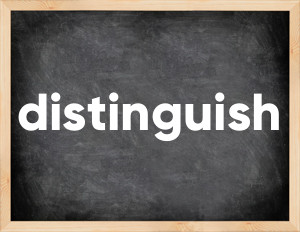 The English verb 'distinguish' is pronounced as [dɪˈstɪŋɡwɪʃ].
The English verb 'distinguish' is pronounced as [dɪˈstɪŋɡwɪʃ].
Related to:
regular verbs.
3 forms of verb distinguish: Infinitive (distinguish), Past Simple - (distinguished), Past Participle - (distinguished).
Here are the past tense forms of the verb distinguish
👉 Forms of verb distinguish in future and past simple and past participle.
❓ What is the past tense of distinguish.
Distinguish: Past, Present, and Participle Forms
| Base Form | Past Simple | Past Participle |
|---|---|---|
| distinguish [dɪˈstɪŋɡwɪʃ] |
distinguished [dɪˈstɪŋɡwɪʃt] |
distinguished [dɪˈstɪŋɡwɪʃt] |
What are the 2nd and 3rd forms of the verb distinguish?
🎓 What are the past simple, future simple, present perfect, past perfect, and future perfect forms of the base form (infinitive) 'distinguish'?
Learn the three forms of the English verb 'distinguish'
- the first form (V1) is 'distinguish' used in present simple and future simple tenses.
- the second form (V2) is 'distinguished' used in past simple tense.
- the third form (V3) is 'distinguished' used in present perfect and past perfect tenses.
What are the past tense and past participle of distinguish?
The past tense and past participle of distinguish are: distinguish in past simple is distinguished, and past participle is distinguished.
What is the past tense of distinguish?
The past tense of the verb "distinguish" is "distinguished", and the past participle is "distinguished".
Verb Tenses
Past simple — distinguish in past simple distinguished
(V2).
Future simple — distinguish in future simple is distinguish (will + V1).
Present Perfect — distinguish in present perfect tense is
distinguished
(have/has + V3).
Past Perfect — distinguish in past perfect tense is
distinguished
(had + V3).
distinguish regular or irregular verb?
👉 Is 'distinguish' a regular or irregular verb? The verb 'distinguish' is regular verb.
Examples of Verb distinguish in Sentences
- I have learnt to distinguish the twins (Present Perfect)
- Will you be able to distinguish our tasks? (Future Simple)
- She doesn't distinguish her own achievements and achievements of others (Present Simple)
- He has the power to distinguish good and evil (Present Simple)
- We couldn't distinguish her voice from voices of others (Past Simple)
- There's still a chance we may distinguish ourselves. (Present Simple)
- He wants to distinguish himself in school (Present Simple)
- There's not much here to distinguish you from hundreds of other contestants (Present Simple)
- They taught us to distinguish our preconceptions from the truth. (Past Simple)
- Afterwards it will be impossible to distinguish one from the other. (Future Simple)